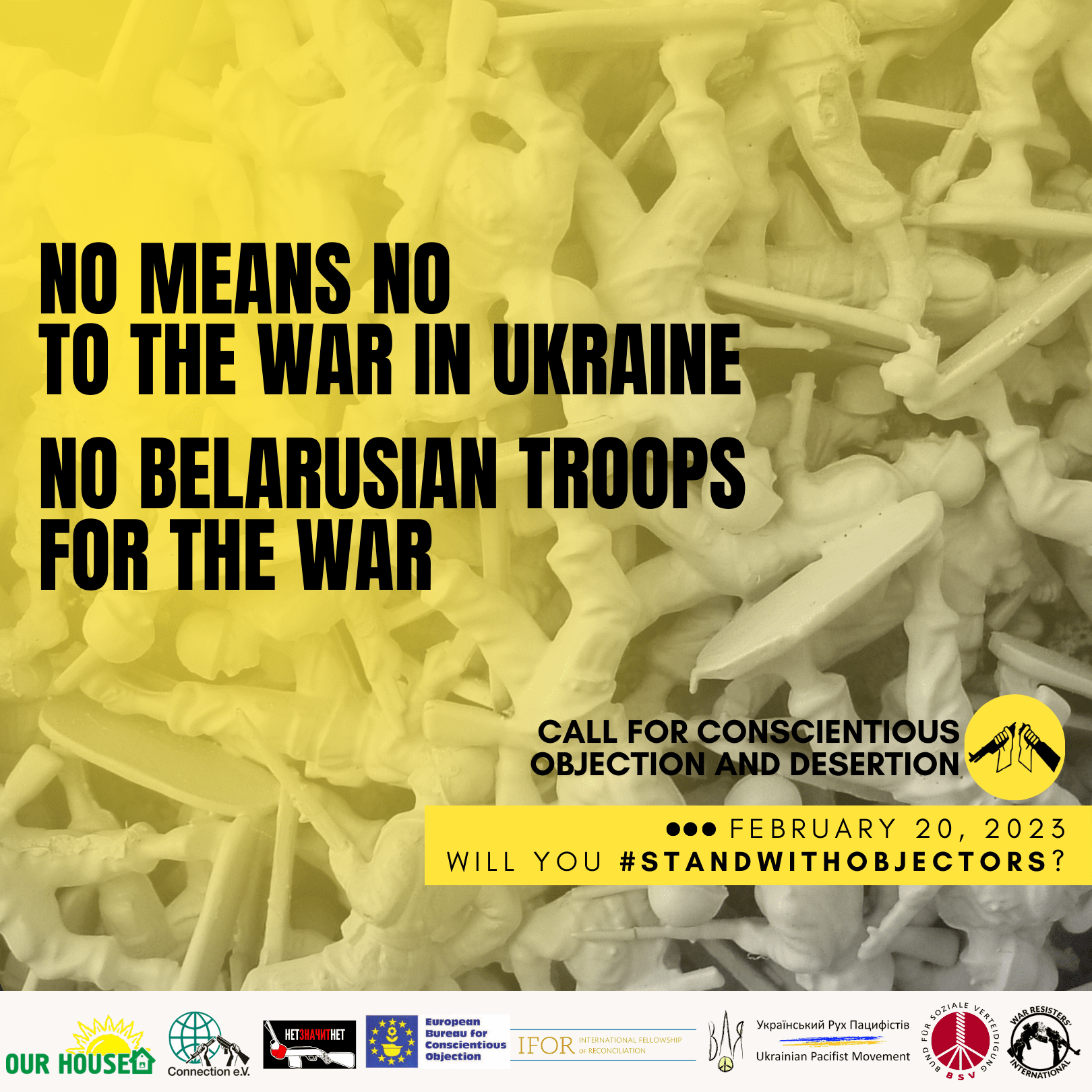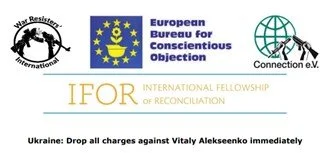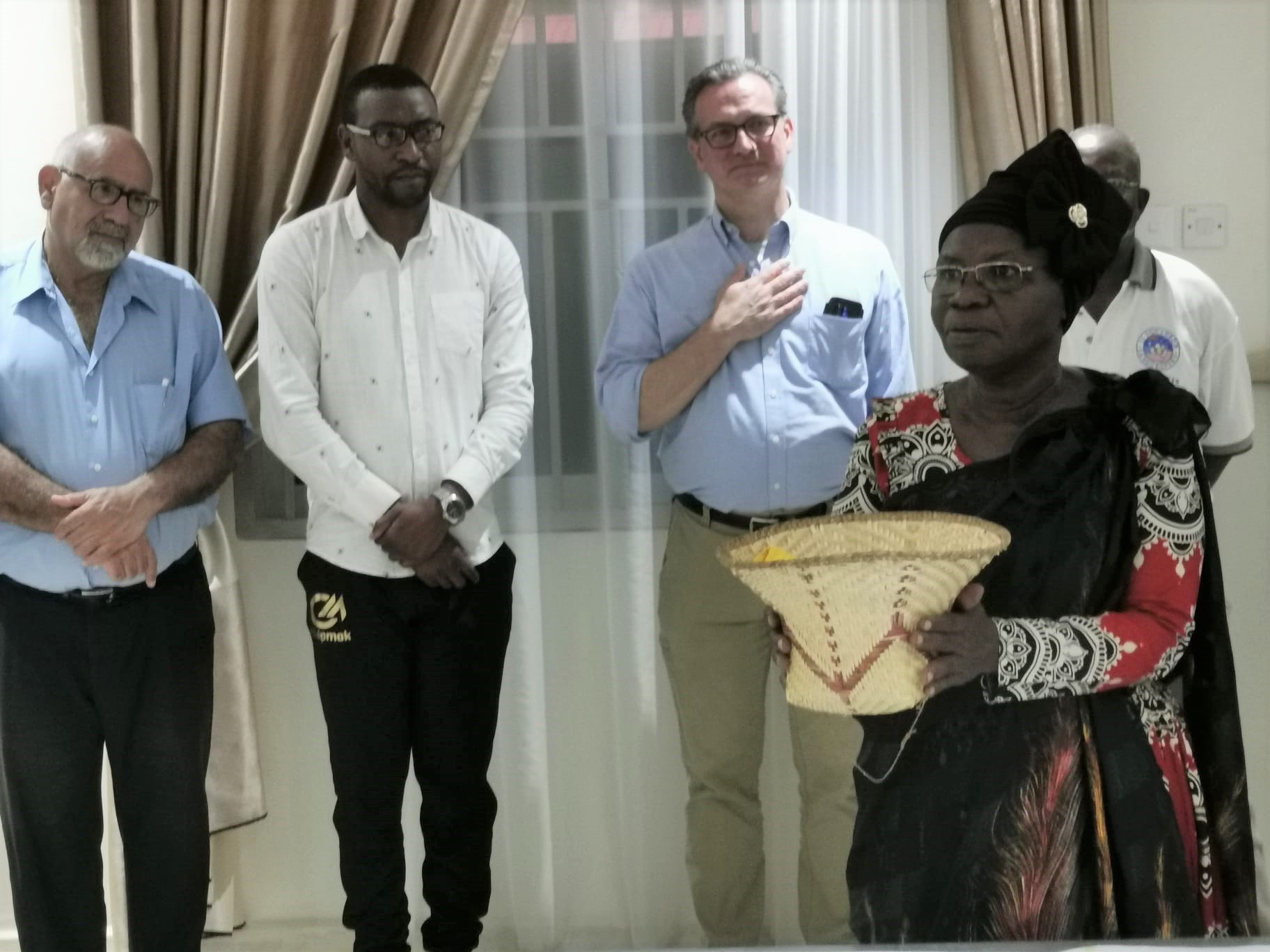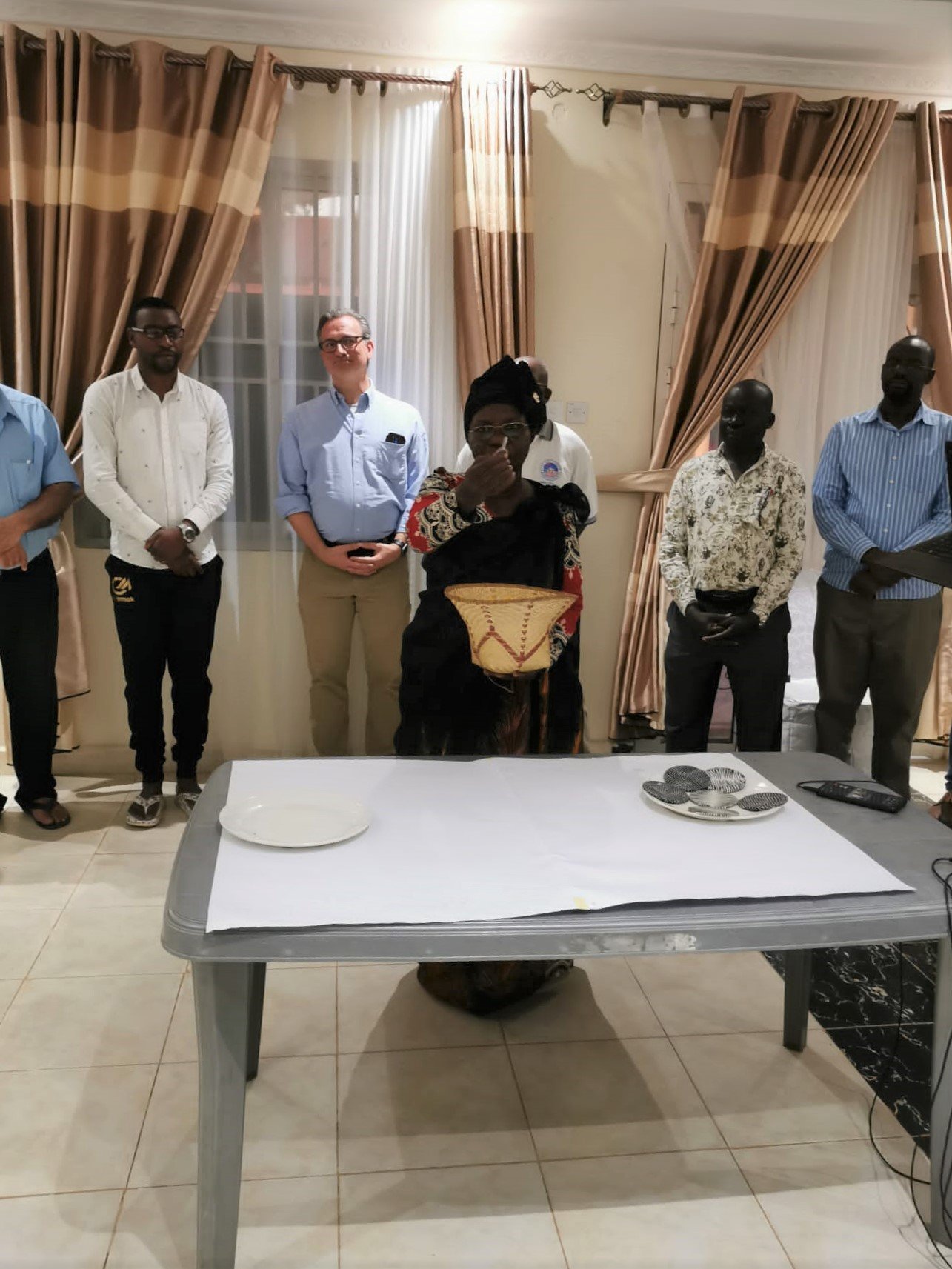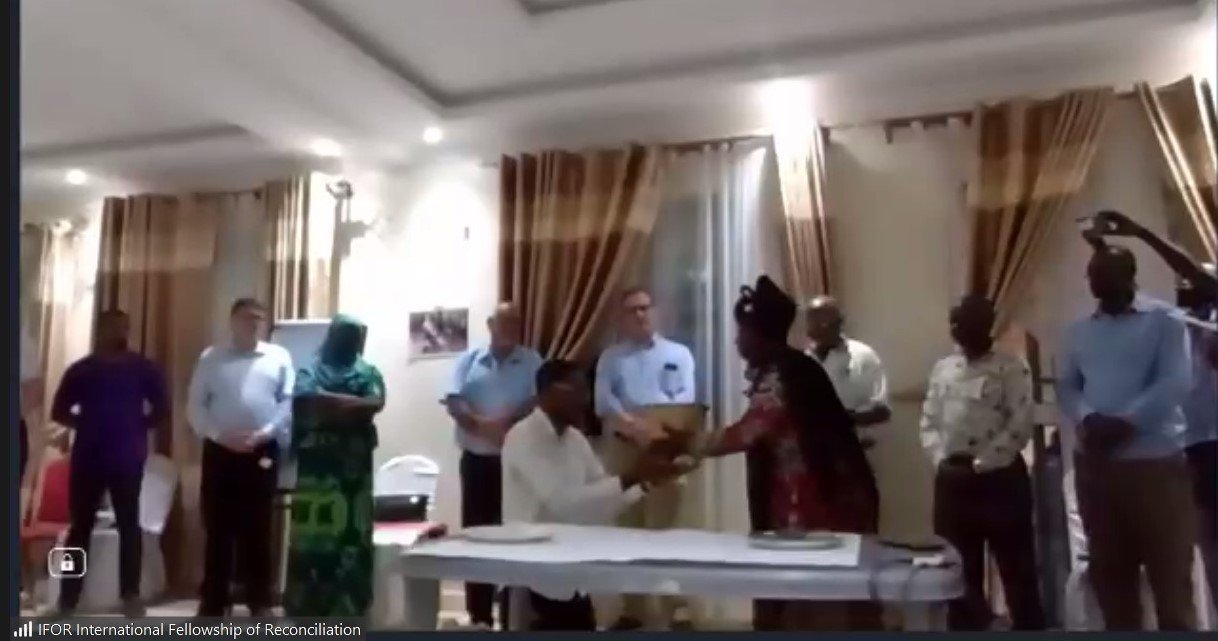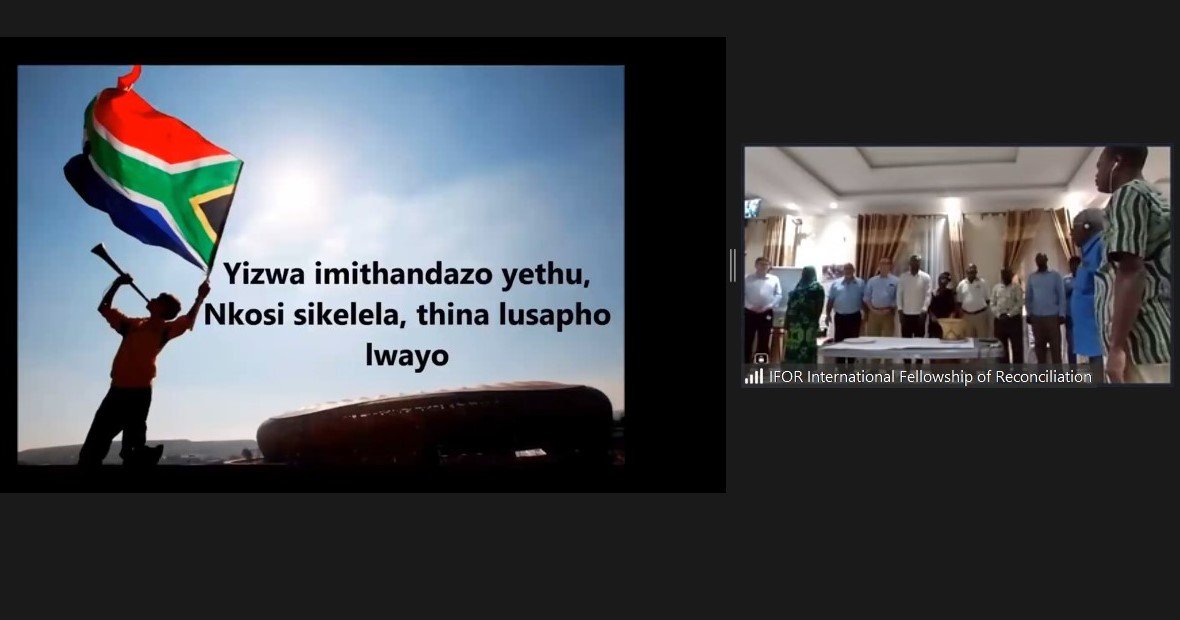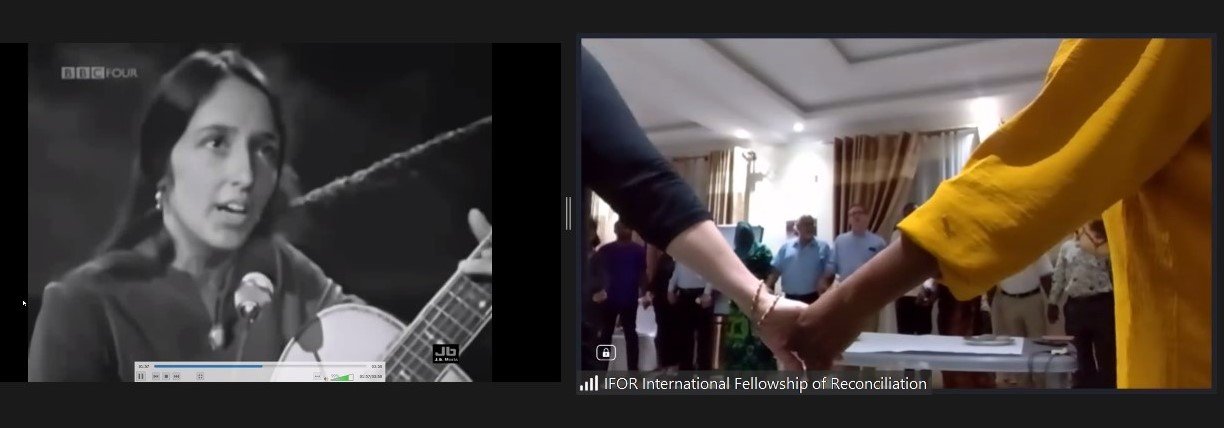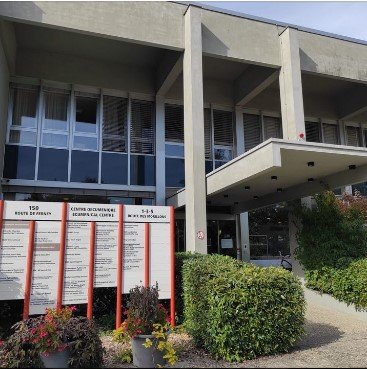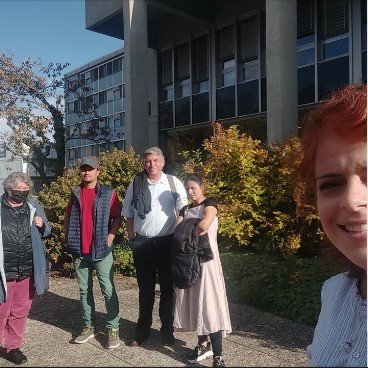International Organizations Call For Actions at the Belarusian Embassies on the 20th of February to Protest Against a Possible Entry into the War in Ukraine by Belarus, and to Support Conscientious Objectors and Deserters.
No Means No – to the War in Ukraine
No Belarusian Troops for the War – Call for Conscientious Objection and Desertion
On the 20th of February 2023, we - Nash Dom, Ukrainian Pacifist Movement, Connection e.V., Federation for Social Defence, International Fellowship of Reconciliation, Agir pour la paix and War Resisters’ International – call for demonstrations outside Belarusian embassies across Europe. These protests will draw attention to the danger of Belarus joining Russia by sending military personnel to attack Ukraine.
The war in Ukraine has raged for almost a year now, and there is little hope that it will end soon. The death toll and the destruction rise daily. Russia is unwilling to end its attack and withdraw, and is pumping more and more troops into Ukraine. The Western countries support Ukraine in its defence by continuing to send more and more heavy weapons. Calls for negotiations and cease-fires remain unheard.
On the 20th of February 2022, Russian troops were ordered to stay in Belarus after the end of a joint exercise with the Belarusian army. Four days later, the attack against Ukraine began, including Russian troops based in the territory of Belarus. Up until now no Belarusian troops have joined the war, though Belarus provides logistical aid to Russia.
The right to refuse to kill is a human right, recognized by various international human rights institutions. In Belarus, this right is not recognized. Conscientious objectors and deserters are persecuted and jailed. This has meant that more than 20,000 young men have been left with no choice but to leave their homeland and seek refuge abroad, because they feared being recruited. Most of them prefer to stay close to their former home – in the Baltic countries and Poland – which puts a heavy burden on their host countries. These countries need support from their partners in the EU! Such a mass movement of objectors also sends a strong message to Russia. Belarus under Lukashenko so far has been the stoutest ally of Putin’s Russia. When its citizens refuse to join the war, this will hopefully further demoralize the nationalist and militarist narratives in Russia as well.
No means no! We call to:
support for Nash Dom’s “NO means NO” campaign. The campaign calls on men of Belarus to refuse to join the army or to leave it if they are already serving: Have the courage to say “No” when asked to join a war that violates international law and causes massive death, suffering and destruction in a neighbouring country! You are a hero if you object, not if you become a soldier in this war!
mothers, fathers, sisters and brothers in Belarus to encourage their boys not to join the military and to help them to escape from recruitment.
to the Belarusian authorities
to respect the human right of conscientious objection to military service and
to restrain from participation in and complicity with the war of aggression against Ukraine by the Russian authorities.
the governments of the European countries
to establish a humanitarian corridor for Belarusian conscientious objectors and deserters.
to give shelter to objectors and deserters from Belarus on humanitarian grounds, without forcing them into an asylum procedure.
the churches to use their influence and moral weight to protect those who refuse to fight.
civil society in all countries to express its support for objectors and deserters from all sides in the war. Support the #ObjectWarCampaign which is demanding shelter and asylum for objectors of the war in Ukraine.
the civil servants and diplomats of Belarus in the embassies where we will hold our protests to express solidarity with those who oppose the war.
For more information in your country, support of the appeal and information about action plans in your country, please write to: info@nash-dom.info
Read here the full text of the call with first signatories.
Join the action 'No means NO - to the War in Ukraine' on February 20th!
INSIGHTS
- “We are concerned that Lukashenko might plan to send the Belarusian army to fight on the side of Russia in the war”, Rudi Friedrich, the coordinator of the German organization ‘Connection e.V.’ says. “We want to send a strong signal in support of the Belarusian NGO Nash Dom’s campaign ‘NO means
NO’ which calls on men of Belarus to refuse to join the army or to leave it if they are already serving."
- “More than 20,000 young men have already left Belarus to avoid service in the army. Most of them are in the Baltic countries or in Poland, adding to the swelling numbers of refugees there. These countries urgently need financial and material aid by their partners in the EU to adequately cater to the needs of these refugees. And we need a humanitarian corridor for them”, explains Olga Karatch, the head of ‘Nash Dom’.
- “To us, the right to conscientious objection which has been established at the UN as a universal human right is essential. Those who do not wish to fight must not be punished or sent to prison as it is currently the case. We call on the Lukashenko regime in Belarus to respect the human right of conscientious objection to military service and to restrain from participation in and complicity with Putin’s regime war of aggression against Ukraine.” explains the Ukrainian Pacifist Movement.
- Dr. Christine Schweitzer, the Coordinator of the German NGO “Federation for Social Defence” expresses the hope that such a mass movement of objectors also sends a strong message to Russia. “Belarus under Lukashenko so far has been the stoutest ally of Putin’s Russia. When its citizens refuse to join the war, this will hopefully further demoralize the nationalist and militarist narratives in Russia as well, and increase the pressure to put an end to this war”, she says. “We also hope that other initiatives, for example those that have in the past supported the twinning between cities in Belarus and the West, use this occasion to make new contact with their partners in Belarus and encourage them to support those who do not want war.”
CONTACTS
Alexia Tsouni, European Bureau for Conscientious Objection (EBCO), ebco(at)ebco-beoc.org, www.ebco-beoc.org (English, Greek)
Semih Sapmaz, War Resisters’ International (WRI), semih(at)wri-irg.org, www.wri-irg.org (English, Turkish)
Zaira Zafarana, International Fellowship of Reconciliation (IFOR), zaira.zafarana(at)ifor.org, www.ifor.org (English, Italian)
Rudi Friedrich, Connection e.V., office@Connection-eV.org, www.Connection-eV.org (English, German)
Ukrainian Pacifist Movement: shelya.work@gmail.com (English, Ukrainian, Russian)
Olga Karatch, Nash Dom, olga.karatch@gmail.com (English, Belarusian, Russian)
Christine Schweitzer, Bund für Soziale Verteidigung, Christine Schweitzer, schweitzer@soziale-verteidigung.de (English, German)


